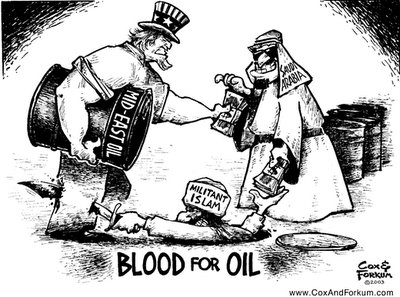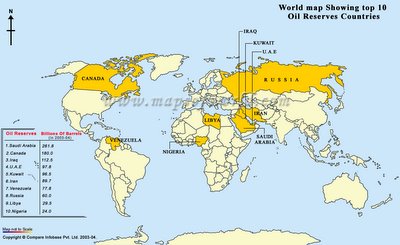The "All Roads Lead to Oil" roundup...

Cox & Forkum are awesome. Click here for the post to go with the above cartoon.
 I have to admit that the "addicted to oil" quote from the last SOTU address didn't sit right with me. I may be addicted to some things, but oil isn't it. Sure, I need it to get to work in my car...and to the grocery store, etc...but I'm not addicted.
I have to admit that the "addicted to oil" quote from the last SOTU address didn't sit right with me. I may be addicted to some things, but oil isn't it. Sure, I need it to get to work in my car...and to the grocery store, etc...but I'm not addicted. Give me a reasonable option and I'm all over it. We do have an issue with being beholden to countries that we don't want to be beholden to because of it. The U.S. must break its dependence on foreign suppliers in unstable parts of the world. What should we do about it...
 ANWR.org has a great video. Click here to check it out.
ANWR.org has a great video. Click here to check it out. Take a look at their top ten reasons to support drilling.
They also have an article worth reading...Seven Billion Dollars from ANWR in President's Budget
"ANWR legislation was blocked on Dec 21 last year by obstructionists in the Senate striking ANWR language from the 2006 Defense Appropriations Bill. Senator Dominici, the Chair of the Senate Resources Committee, is keen to re-engage ANWR language in Congress this Spring.
ANWR revenues are hugely important to the US federal budget as they are one of the very few items that brings money into the government without coming from taxes of ordinary citizens. This estimate increase of $7 billion makes ANWR oil even more vital to the nation. This is an immediate cash injection into America that does not rely on building infrastructure or delays in construction of an oil field, estimated at roughly 6 years."
Recent articles about drilling in VA and FL

Opinion Journal Addicted to Polls President Bush's startling left turn on energy policy.
"President Bush has seen the energy future, and he has two words of advice: wood chips. Somewhere in his cardigan sweater next to a fireplace, Jimmy Carter is smiling.
...At least Mr. Bush bothered to mention nuclear energy, which is the only realistic substitute to fossil fuels short of a technological breakthrough...
The truth is that many green groups, and the political liberals who follow them, don't object to imported oil because it comes from the Middle East. They are opposed to fossil fuels, and nuclear energy for that matter, on principle. They want to live in a world that runs on wood chips, and it's hardly useful to have a conservative President telling the country he agrees with them."
TCS Daily Addicted to What?
"America is no more addicted to oil than it is addicted to bread, to milk, to paper, to water, to computers or, in the immortal words of the late Robert Palmer, to love.
We use oil -- and other unmentioned but implied addictions like coal and natural gas -- to generate energy that powers our cars, heats our homes, lights our cities, runs our factories. By the standard of what they do for us, fossil fuels are pretty cheap. They provide enormous industrial leverage. But, at least in the short term, they are getting more expensive -- in part because demand is rising (mainly in other nations, like China and India, that want to have standards of living like ours) and in part because supply isn't keeping up."
 President Bush's Advanced Energy Initiative and Energy Policy
President Bush's Advanced Energy Initiative and Energy PolicyThe President’s Energy Vision
President Bush believes the power of technology and the innovative spirit of America will reduce our reliance on foreign sources of energy, which will help ensure a growing and prosperous America in the 21st Century. We have both the technology and the know-how to meet the principal energy challenges we face: promoting energy conservation, repairing and modernizing our energy infrastructure, and increasing our energy supplies in ways that protect and improve the environment. Meeting each of these challenges is critical to expanding our economy, satisfying the energy needs of a growing population, and raising our standard of living.
A sound energy policy is also vital to national security and protecting the environment. We currently spend more than half a billion dollars a day on imported oil. We are increasingly concerned about the vulnerability of the electricity grid and pipeline systems to both unintentional and intentional disruptions. We are also focused on the environmental consequences of energy production, including emissions of air pollutants and greenhouse gases, primarily from the burning of coal, oil, and natural gas.
Since 2001, the Administration has spent nearly $10 billion to develop cleaner, cheaper, and more reliable alternative energy sources. As a result, America is on the verge of breakthroughs in advanced energy technologies that could transform the way we produce and use energy. To build on this progress, the President’s Advanced Energy Initiative provides for a 22% increase in funding for clean-energy technology research at the Department of Energy in two vital areas:
1. Changing the way we fuel our vehicles. We can improve our energy security through greater use of technologies that reduce oil use by improving efficiency, expansion of alternative fuels from homegrown biomass, and development of fuel cells that use hydrogen from domestic feedstocks.
2. Changing the way we power our homes and businesses. We can address high costs of natural gas and electricity by generating more electricity from clean coal, advanced nuclear power, and renewable resources such as solar and wind.
Just as our current challenges did not arise overnight, neither will the solutions to these challenges. We must make a sustained commitment to addressing the fundamental causes of high and volatile energy prices, while protecting our national security and the environment. Through the Advanced Energy Initiative, we can take new, bold steps towards the goal of a reliable, affordable, and clean energy future for all Americans.

NewsMax -Can Mexican Oil Save the U.S.?
"He (Clay Sell) might as well have said: 'We're addicted to our standard of living and our way of life,' " Rattie said.
Where can we look for relief? Maybe Mexico?
In the same article, The Chronicle explains that political leaders in that country may finally be willing to allow increased drilling in oil-rich Mexico.
"In Mexico, where industries from steel to ceramics to fertilizer have been hard-hit by high natural gas prices, there may finally be the political will to open the country to outsiders who want to explore for more oil and natural gas, according to Fernando Canales Clariond, Mexico's energy secretary," reports The Chronicle.
Intellectual Conservative Did you say "Addicted to Oil" Mr. President?
If America’s oil usage is an addiction, from where we import our oil is irrelevant. All that matters is that we must end the addiction. The problem is that windmills won’t keep our lights burning, corn ethanol our planes flying, switch grass our factories humming. Oil can do so and will, for decades to come. Oil is not an unhealthy or immoral addiction, it is a legitimate source of energy created for human use. Eliminating its use would throw America back into the dark ages with social conditions that not even the most rabidly liberal opponent of the SUV would tolerate for a moment.
Lee Hamilton Oil dependency's dangers
America's rising dependence on foreign sources of oil and gas is one of our greatest policy failures. This has been principally a failure of political will.Just what are the costs of our addiction? To begin with, our economy is dangerously vulnerable because of the necessity of oil and gas to heat our homes, power some industries and, most important, keep vehicles moving. Because of this dependency, we suffer economic shocks when access to oil and gas is threatened: the OPEC embargo, the Iranian revolution, Iraq's invasion of Kuwait, the war in Iraq, Hurricane Katrina and militia attacks in southern Nigeria are just a handful of incidents that have driven up oil and gas prices, slowing growth and making life harder for millions of Americans.
This dependency is a huge constraint on foreign policy. Because most of the world's known energy reserves are in the Persian Gulf, every recent president has called this region vital to American interests, and we place an inordinate amount of attention and spend vast amounts of resources trying to keep the region stable. Above all, we are tied to a rigid tradeoff with the Saudi royal family: We guarantee their security; they guarantee affordable prices for oil.
We are open to the charge of hypocrisy. Western money that floods the Persian Gulf has helped to further Islamist causes, notably the spread of radical Islamic schools and, in some cases terrorism. Oil money provided a seed for nuclear programs in Iraq and Iran. Meanwhile, our ability to deal with threatening yet energy-rich states like Iran is curtailed because of their ability to drive up the price of oil, and leaders in Venezuela or even Russia have some leverage over the United States. Finally, our pursuit of other goals -- for instance, Israeli-Palestinian peace -- is constrained because of the need to maintain access to oil.
Knight Ridder News - Kevin G. Hall - Oil independence is possible, but does America want it bad enough?
In November 1973, President Richard Nixon announced "Project Independence" to end U.S. reliance on foreign oil by 1980. He asked William Hogan to help lead the crusade. Hogan spent the ensuing energy crisis years as deputy director of the forerunner to today's Department of Energy. But Americans are now more dependent than ever.
Hogan believes energy independence is illusory. Oil remains the world's most cost-efficient fuel and is likely to remain so indefinitely. The real goal, he believes, should be reducing Americans' vulnerability to price and supply shocks.
The problem is "there's still all this oil in the Middle East" said Hogan, now a Harvard University professor. Because the Middle East is home to most of the world's proven oil reserves, it's expected to remain the low-cost oil producer for decades. And oil is likely to be the fuel of choice as long as it remains cheaper than alternatives, Hogan said.
If America went cold turkey, it would mean switching to higher-priced or heavily subsidized alternative fuels, which Americans and the government have resisted since Ronald Reagan won the presidential election in 1980.
And there's still the question of how quickly the nation could replace the 136 million gasoline-powered cars that cruised America's highways in 2004, the latest year Federal Highway Administration data are available.
During his State of the Union address, Bush called for reducing three-fourths of the oil that the United States purchases from the Middle East by 2025. A day later, his energy secretary clarified the goal - it's actually to reduce oil imports from anywhere by the equivalent of 75 percent of projected Middle East imports.
The Energy Department projects that Middle East oil imports will total 6 million barrels per day in 2025, so Bush's goal means displacing 4.5 million barrels a day by then.
That's more like a bartender taking away the glass but leaving the bottle. The United States would still be consuming nearly 23 million barrels per day of oil, and about 13 million barrels a day would come from abroad.
Bottom line: Under Bush's approach, America would remain addicted to foreign oil and still vulnerable to price shocks in a global market.
Philadelphia Inquirer Funding New Fuels Fill 'er up - with investment
The country needs to take risks on new technology, the way it has on wind. Federal tax credits and state portfolios assuring market share contributed to a record year for turbine installations in 2005. Wind eventually could generate as much as 20 percent of the nation's electricity, up from 1 percent now.
America has the know-how to wean itself from oil. It just has to make the commitment and investment.
Bush quotes:
"The issue, of course, is whether or not good intentions are met with actual dollars spent"
“Some of the nations we rely on for oil have unstable governments, or fundamental differences with the United States...These countries know we need their oil and that reduces influence. It creates a national security issue when we’re held hostage for energy by foreign nations that may not like us"...
“We ought to start building nuclear power plants again. I think it makes sense to do so. Technology is such that we can do so and say to the American people, these are safe — and they’re important,”
Labels: Cox and Forkum, Iran, Iraq, Islam/Radical Islam, Jimmy Carter, Middle East, Ronald Reagan, UN




















-Home-